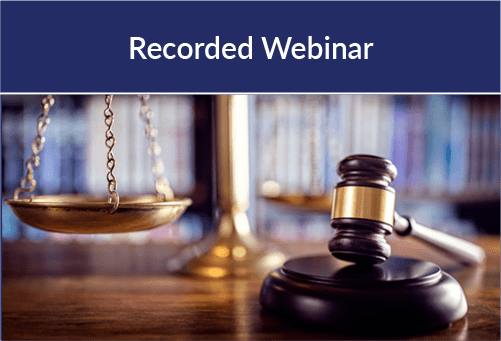


View this webinar to learn about an important funding opportunity available for tribal communities – the Bureau of Justice Assistance’s (BJA) FY 2023 Comprehensive Opioid, Stimulant, and Substance Use Program (COSSUP) Site-Based Solicitation. BJA is seeking applications to respond to illicit substance use and misuse to reduce overdose deaths, promote public safety, and support access to treatment and recovery services in the criminal justice system, and strongly encourages tribal communities to consider applying under Category 1c. Additional available relevant funding opportunities for tribal communities are also reviewed.

Organizations should routinely assess their capacity to serve their community and fulfill the stated mission. In this training, define the evaluation process and review the tools that help determine the impact you have within your community. Review best practices for documenting the impact of program services that achieve grant deliverables, strengthen future funding opportunities, and build new programs that assist your community. Emphasize continuous improvement processes that build accountability, prioritize problem-solving strategies, and align measurable outcomes with organizational strengths.

Discuss the value of peer recovery support services (PRSS) to enhance substance use recovery. Explore the history of peer support as an effective intervention for tribal populations. Engage in peer exchange with tribal representatives who have implemented a peer support program, including an opportunity for Q&A. This webinar will review a new valuable resource available to support tribes interested in implementing a PRSS Program, Culturally Responsive Pathways to Peer Programming in Tribal Communities. Discover available grant funding and training and technical assistance opportunities.

SORN programs typically experience significant challenges related to staff turnover, inadequate resources, court challenges, and lack of skill development opportunities. Whether you are new to this area of work or are experienced, join us for an intensive two-day skill development training designed specifically for SORN personnel. During the training, we will cover an introduction and overview of SORN laws, registration of offenders, community notification to the public, and enforcement and compliance issues. Advanced skill development such as registrant monitoring and compliance, and community notification meetings will also be covered. Participate in this interactive training which includes educational information, ready-to-use resources, case studies, interactive discussion, and opportunities to apply learned skills.

New COSSUP Site-Based Funding Opportunity Provides Support to Tribal Communities! The Bureau of Justice Assistance (BJA) is seeking applicants for the FY2024 Comprehensive Opioid, Stimulant and Substance Use Site-Based Program (COSSUP) to respond to illicit substance use and misuse to reduce overdose deaths, promote public safety, and support access to treatment and recovery services in the criminal justice system. Tribal communities are strongly encouraged to consider applying under Category 1c.

Join us to gain an introduction to victim/survivor centered approaches, a summary of promising practices, and challenges and opportunities to be more victim/survivor centered. Each 60 minute session features a brief overview presentation followed by an opportunity to engage in an in-depth facilitated discussion and question and answer (Q&A) session with subject matter experts, practitioners in the field, and other attendees. Your participation is encouraged and additional questions will be taken during this live session. Prior to the session, we will gather feedback from you about what you would like to learn about the topic from the experts

Discuss the various dynamics of asphyxiation abuse in children and identify commonly missed opportunities for evidence-gathering. Attendees will be taught the basics of anatomy, discuss the various forms of asphyxiation and highlight the signs and symptoms that may be present after this type of attack. All members of the multidisciplinary team including law enforcement, CPS, forensic interviewers, medical providers and prosecutors will learn the tools to assess and interview children who have been asphyxiated. With proper training and protocol, practitioners have started to better identify this often missed and sometimes lethal crime, finally giving this crime and the victims a voice.

Discuss the various dynamics of asphyxiation abuse in children and identify commonly missed opportunities for evidence-gathering. Attendees will be taught the basics of anatomy, discuss the various forms of asphyxiation and highlight the signs and symptoms that may be present after this type of attack. All members of the multidisciplinary team including law enforcement, CPS, forensic interviewers, medical providers and prosecutors will learn the tools to assess and interview children who have been asphyxiated. With proper training and protocol, practitioners have started to better identify this often missed and sometimes lethal crime, finally giving this crime and the victims a voice.

Become more mindful of the need to implement and sustain tribal sovereignty, unique to your nation, into all aspects of your tribal justice system. During the webinar series, you will learn more about tribal sovereignty, how it might be exercised or how it is exercised in your own community, and what to consider as you begin your tribal justice system planning process. You will also learn a process to take steps to identify opportunities for the inclusion of customs, traditions, and values into your tribal justice systems.

Become more mindful of the need to implement and sustain tribal sovereignty, unique to your nation, into all aspects of your tribal justice system. During the webinar series, you will learn more about tribal sovereignty, how it might be exercised or how it is exercised in your own community, and what to consider as you begin your tribal justice system planning process. You will also learn a process to take steps to identify opportunities for the inclusion of customs, traditions, and values into your tribal justice systems.
